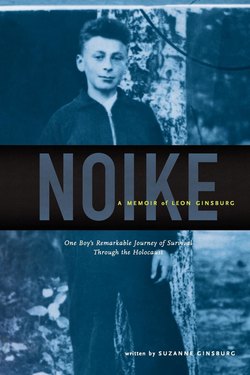Читать книгу Noike: A Memoir of Leon Ginsburg - Suzanne Ginsburg - Страница 13
На сайте Литреса книга снята с продажи.
Оглавление7
THE LITTLE SEPIA PHOTO
New York, circa 1980
The wooden dresser in my parents’ bedroom was too tall for me to reach when I was little, but I could see it from a distance, reach it if I pulled over a chair. Sometimes I carried over the vanity chair from the master bathroom, other times I dragged the wicker chair from beside the television. Eventually I could stand on my tiptoes, stretch my arms out, and run my fingers across the shiny, lacquered surface. On it rested a ceramic vase from China, a wooden jewelry box from Japan, and framed photos of my grandparents.
My hands would immediately gravitate to the framed pictures.
The large, color photo of my maternal grandparents was taken at my parents’ wedding reception, in front of a blue, floral background. My maternal grandmother, whom I called Baba, is in a pink, satiny dress and has her dark, brown hair pulled into a tight bun. Her arm is wrapped around my grandfather, who is dressed in a black tuxedo. He has jet-black hair and a pencil-thin mustache; both are neatly trimmed. I never knew this grandfather but my Baba often referred to him as my Zeidi and said that he was a “good man.” A few months before she died, she told me she would be seeing him soon.
The photo of my paternal grandparents was much smaller in size and more mysterious: their image is painted in sepia tones; they are floating in front of a solid sepia background. The photo must have been taken somewhere in Europe, I guessed. My grandmother looks very fashionable in the photo, her hair done in the finger wave style I had seen in old movies. My grandfather is wearing a tweed, three-piece suit with a skinny tie and a handkerchief in one pocket.
I first understood that they were dead when I learned that my siblings were named after them: my sister after Pesel, my brother after Kalman. My mother told me that my Grandfather Kalman died before the war, while my Grandmother Pesel died during the war. I somehow understood that during the war implied a more tragic end; I never dared to ask for more detail. They were never referred to as my Baba or my Zeidi; their premature deaths somehow robbed them of our familial endearments.
When no one was looking I would take the frames down from the dresser and gently place them in an arc on the nubby yellow carpet, as if they were guests at a tea party. Sitting cross-legged on the floor, I would pick up the picture of my paternal grandparents by the edges of its lacy gold frame, careful not to get my fingerprints on the glass. The little photo was magical, a secret portal to my lost grandparents. Did I have his eyes? Her smile? I would stare into the photograph, trying to venture back in time, wondering what it would be like to meet them.
I would close my eyes and picture myself in their living room.
“I’ve heard so much about you Suzala,” I imagined my Grandmother Pesel saying. All of the older relatives liked to call me Suzala; I imagined she would do the same. “Would you like some fluden?” she tilted her head as she asked. “I just took it out of the oven.”
I nodded my head, eager to try the sweet-smelling pastry.
“Save some fluden for me,” my Grandfather Kalman chuckled as he entered the room. “Shall I play some violin for you, mamela? I hear you’ve been taking lessons at school.” My grandfather grinned, somehow sensing that I had been having difficulty.
“Yes, my friend Heidi and I take lessons together,” I replied eagerly. “But we can’t stand our teacher, Mr. Van Houten—he makes us practice the same boring piece over and over.”
We would continue to talk about all of the things that I thought grandchildren and grandparents should know about each other—birthdays, favorite colors, favorite desserts—until I heard someone coming up the stairs. They would nod their heads, letting me know it was all right to say goodbye. As I kissed them through the glass frames, I would tell them that I loved them and promise to visit again soon. Standing on my tiptoes, I would reach forward, carefully placing the photos back on top of the dresser, positioning them exactly as I found them.
